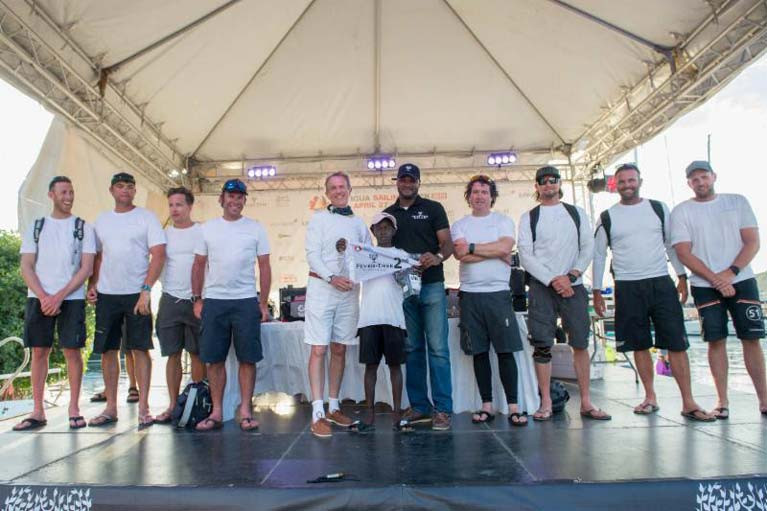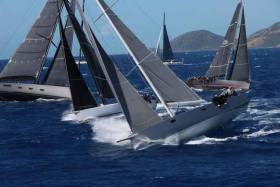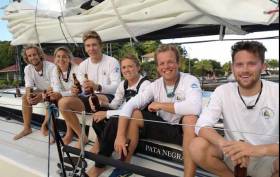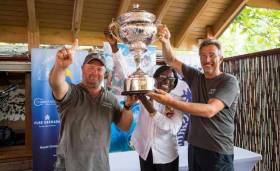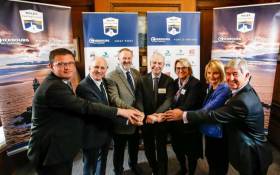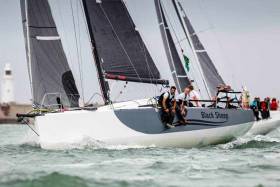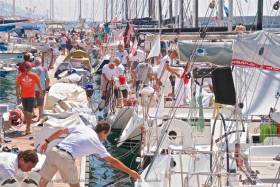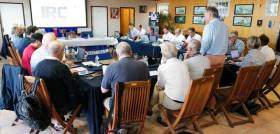Displaying items by tag: RORC
Ten Irish Sailors to Contest RORC Caribbean 600 Race
So far ten or more Irish sailors have registered as crew members on the following boats for the Royal Ocean Racing Club's Caribbean 600 Race starting in less than a month.
The inaugural 2009 winner, Royal St. George's Adrian Lee with Lee Overlay and Partners returns this time on a Swan 60 as Afloat previously reported here.
 Adrian Lee of the Royal St. George Yacht Club
Adrian Lee of the Royal St. George Yacht Club
Starting on Monday, 24 February, teams from around the world will descend on Antigua for the non-stop race around 11 islands.
Three Irish sailors are on Pata Negra, Giles Redpath’s Lombard 46 that competes in IRC One. Former RORC Commodore Michael Boyd, 1996 Olympian Marshall King (and more recently a J70 champion) and James Murphy are all onboard. It is the fourth Caribbean 600 race for the Round Britain and Ireland winner. Redpath is joined by an experienced group of inshore and offshore sailors - a mix of professionals and good friends who all have all sailed with him on Pata Negra.
 Michael Boyd of the Royal Irish Yacht Club
Michael Boyd of the Royal Irish Yacht Club
The Lombard 46 was third in class in 2019 and second in ’the 18 race under Michael Wright of Howth Yacht Club. Andy Lis is boat captain and he will be backed up by Will Harris as navigator, Sam Matson on trim and Royal Irish's Boyd on the helm.
In his 90th year, American Don Street, who hails from Glandore in West Cork, will compete on Kinship.
The lifetime sailor has spent 45 years cruising, charting and writing about the Caribbean for his famous guide books. 40 of those years were spent in his 46ft engineless yawl, Iolaire, built-in 1905.
Iolaire flew the RORC burgee for 80 years!
“My nickname used to be ‘squeaky’ but with the way I am having holes cut in me, it should be changed to ‘swiss cheese’, says Street. He will be racing with a team who has sailed and raced Kinship for over a dozen years, with good results in ocean races and local regattas along the East Coast of the US. Oldest combined crew ages? A 91-year-old will also on be on board!
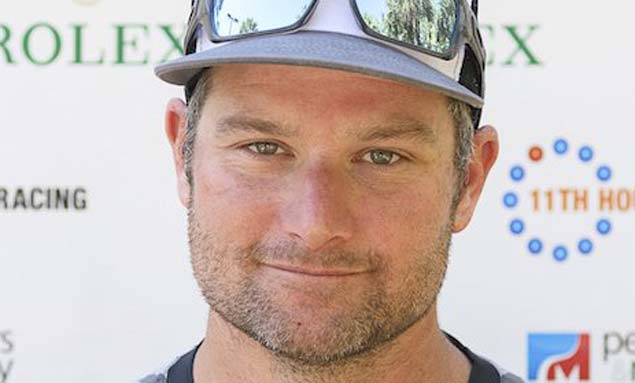 Ronan Grealish of Galway Bay Sailing Club
Ronan Grealish of Galway Bay Sailing Club
Elsewhere in the fleet, Galway Bay's Ronan Grealish competes on the Swedish VO65 Childhood 1.
Helen Flannery competes on the French-flagged Aminata.
Howth Yacht Club's Laura Dillon is on the British Beneteau 47.7 EH01.
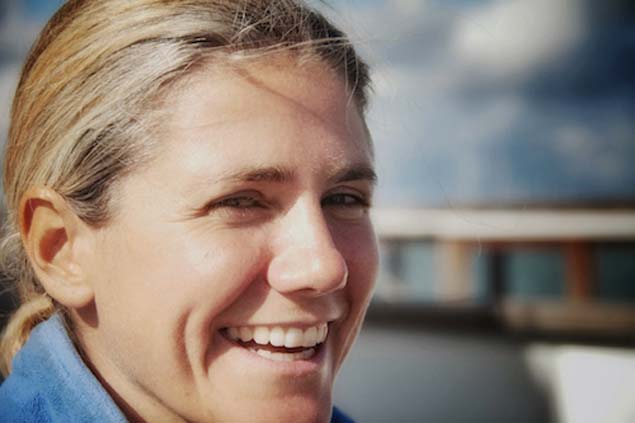 Howth Yacht Club's Laura Dillon
Howth Yacht Club's Laura Dillon
Neil Maher is on the Sail Racing Academy Beneteau 40.7 Escapado and Clipper Round the World Skipper Sean McCarter is on the 25m Swan, Umiko. This is the same vessel that took a National Yacht Club crew across the Atlantic on the ARC before Christmas 2019 as Afloat reported here.
For many, it will be their first time in the race, whilst for others, it's a chance to defend their titles or improve on past results as they are lured back to this challenging race.
The Royal St. George Yacht Club's 2009 winning skipper Adrian Lee will be racing his Swan 60 Lee Overlay Partners II in next month's RORC Caribbean 600 writes Louay Habib.
For the 12th edition of the RORC Caribbean 600, 21 teams - racing yachts of 50ft (15.24m) or over - have already signed up for the 600-mile blast around 11 Caribbean Islands. The competition in all the classes will be as fierce as ever. However, history has shown that the best performer in the big boat class is likely to be rewarded with the overall win. Since the first race in 2009 overall victory under IRC for the RORC Caribbean 600 Trophy has been dominated by big boats.
The racecourse and weather combine to produce a thrilling race in tropical heat with non-stop action for the international fleet. In February, the trade winds are pumping over 20 knots with up to two metres of swell. The course design capitalises on these stunning conditions with numerous legs off the breeze. This combination provides spectacular racing at full pelt.
Peter and David Askew (USA) racing Volvo 70 Wizard will be defending last year's overall win. Wizard's crew will include stars from the Volvo Ocean Race: Charlie Enright (USA), Robert Greenhalgh (GBR), Phil Harmer (AUS), Will Oxley (AUS), Mark Towill (USA), Curtis Blewett (CAN) and Richard Clarke (CAN).
"It's the toughest 600-mile race in the world. Lots of turns and always windy," commented Peter Askew. "We are most looking forward to being out of the cold Mid-Atlantic USA weather for a week in late February. The course in general is what makes the event unique; sailing for 600 miles through all the islands is a blast and the beautiful trade wind sailing conditions are perfect for our boat."
Ron O'Hanley (USA) racing Cookson 50 Privateer was the overall winner in 2013 and came second overall to Rambler 88 in 2018. Boat Captain Scott Innes-Jones (NZL) is looking forward to racing in 2020.
"Privateer is a good all-rounder, so we need a bit of everything," commented Innes-Jones. "If we just get big reaching, the bigger boats put us away, but if there are a couple of slow spots we can come back at them. Since the boat was originally designed it has really changed; we have optimised Privateer as best we can. To win you have to sail well and have a bit of luck, everything has got to go your way."
Four examples of Nautor's Swan have already entered the 2020 RORC Caribbean 600, including 2009 winning skipper Adrian Lee (IRL) who will be racing his Swan 60 Lee Overlay Partners II. Swan 95 Lot 99, sailed by Jeroen Van Dooren (NED) is the largest Maxi entered to date. Race founder and long-standing RORC member John Burnie (GBR) will be taking part in his tenth race on board Lot 99. Burnie has raced on board a number of Maxis and superyachts in the race. In 2009, Burnie skippered Claude Telier's Orma 60 Région Guadeloupe to victory in the Multihull Class, setting a record that was not bettered until 2015.
"In Caribbean conditions waterline length is quite critical and it's a very thrilling ride," commented Burnie. "So much of the course is fast reaching, especially Tintamarre to Guadeloupe and La Désirade to the Barbuda mark. However, these legs are unlike other long races, as even on a Maxi, the corners come up fast and you can't really relax - you are always preparing for the next manoeuvre. This makes for fantastic sailing, particularly at night when it is absolutely sensational. Teamwork is everything, inevitably when you race on a boat of that size you have a range of sailors that have come together, and when you finish the race, you get a wonderful greeting from the volunteers dockside with cold beer - it is a euphoric moment for the whole team!"
Lee Overlay Partners II will be racing in IRC One and similar rivals include the classic 1974 restored Swan 65 Libélula, sailed by Francisco de Borja Pella (ESP) and OnDeck's Paul Jackson racing Antiguan Farr 65 Spirit of Juno. Proven winners in IRC One include: Giles Redpath (GBR) racing Lombard 46 Pata Negra, Philippe Frantz's (FRA) NM43 Albator and RP37 Taz, raced by Bernie Evan Wong (ANT) who has competed in every edition of the race.
New to this year's race will be GP42 Phan which has been chartered by Patrick and Catherine Keohane (GBR). The couple have raced before, but this is the first time in IRC One. The pocket rocket will be co-skippered by Catherine Keohane and performance coach Nigel King.
"The course is in itself a challenge and this, combined with the weather, offers a great test for all," commented Keohane. "There are parts of the course where you really need to be on top of your game anticipating weather, affects from the islands, and try to think three steps ahead tactically to gain an advantage. We have put together an international team and the challenge will be in getting the team to gel, be competitive and have fun on the water!"
The 12th edition of the Royal Ocean Racing Club's RORC Caribbean 600 will start on Monday 24th February 2020 from Antigua.
2020 RORC Caribbean 600 Battle Lines are Forming
The 12th edition of the Royal Ocean Racing Club's Caribbean 600 will start on Monday 24th February 2020 from Antigua. Already the early entries are nudging towards an eclectic mix of 50 boats, with competition expected to be as red hot as ever. Previous overall and class winners are already committed to the thrilling 600-mile race around 11 Caribbean islands.
"A key ingredient to a great event is a good mix in the fleet and the early entries are showing that we will have fierce and friendly competition in every class," commented RORC Racing Manager Chris Stone. "As well as the race for overall and class honours, there are battles within the fleet between boats of similar speed. Close competition is a great catalyst for performance and the RORC is really excited about the prospect of another thrilling edition of the RORC Caribbean 600."
Last year's overall winner, American Volvo 70 Wizard will have a stellar crew led by David and Peter Askew. Wizard will be attempting to retain the RORC Caribbean 600 Trophy, a feat never achieved in the 11 previous editions of the race. Winning IRC Zero will be Wizard's first goal and to do so, they will need to beat 2013 overall winner, Ron O'Hanley's American Cookson 50 Privateer, which was runner-up to Wizard last year. IRC Zero will also include Joe Mele's American Cookson 50 Triple Lindy. A trio of canting keel round the world racing yachts; VO65 Childhood 1, VO70 I Love Poland and Volvo 70 Telefonica Black will also compete in the class.
Entered for the RORC Caribbean 600, but still awaiting class clarification, is one of the most famous round the world racing yachts, Farr 58 Maiden, which made history in 1989 as the first all-female crew to sail around the world in the Whitbread Round the World Yacht Race, coming second overall. The largest yacht entered to date is the Swan 95 Lot99 sailed by Jeroen Van Dooren.
Entries in IRC One include the 2018 class winner Philippe Frantz with his NMD 43 Albator. Giles Redpath's British Lombard 46 Pata Negra is also entered and was third in class last year, and second in 2018. Bernie Evan Wong's RP37 Taz, class winner in 2017, will be proudly flying the Antiguan flag. Bernie has skippered a yacht in all previous 11 editions. Kevin McLaughlin's American Xp55 Rye will see the father and son team return. Their best result was third in class with Spice in 2018. Adrian Lee was the overall winner in the first RORC Caribbean 600 in 2009 and this year will be racing his Swan 60 Lee Overlay Partners.
Ross Applebey's British Oyster 48 Scarlet Oyster is probably the most successful yacht in the history of the race. Racing Scarlet Oyster, Applebey has led his team to class victory on five occasions, and Ross also won on Scarlet Island Girl in 2017 to keep a winning streak dating back to 2012. Competition in IRC Two will be as hot as anywhere, with the entire class podium from 2019 entered, including last year's runner up, Global Yacht Racing's British 47.7 EH01, skippered by Andy Middleton, and Pamala Baldwin's Antigua J/122 Liquid.
IRC Three will have some of the smallest yachts racing in the RORC Caribbean 600, and arguably the toughest race in terms of stamina and tenacity to complete the 600-mile course. Richard Palmer's British JPK 10.10 Jangada, overall winner of the 2019 RORC Transatlantic Race, will be racing Two Handed with Jeremy Waitt. For another victory, Jangada will have to out-perform larger fully crewed yachts.
Three of the world's fastest multihulls will also be on the startline; Jason Carroll with Argo (MOD 70), Giovanni Soldini's Maserati (Multi 70), and Peter Cunningham's PowerPlay (MOD 70) will be match racing for Multihull Line Honours, but the Multihull Class is decided by the MOCRA rating rule and last year's runner-up, Greg Slyngstad's American Bieker 53 Fujin will be back to try to better this result. Returning to the racecourse under new ownership is the Nigel Irens 63ft trimaran Shockwave. Formerly Paradox, which won the MOCRA Class in 2018, Shockwave will be sailed by multihull specialists Scott Klodowski and Jeff Mearing.
National Yacht Club Cadet Conor Totterdell Second in RORC Transat
Dubin Bay sailor Conor Totterdell of the National Yacht Club has just completed his first transat race on a Lombard 46, Pata Negra in the 2019 RORC Transatlantic Race.
The race proved to be a test of competence in many different areas. A steady breeze off the stern quarter of between 15-30 knots provided tense and fast racing with Bouwe Bekking aboard Swedish VO65, Childhood 1, registering a 24-hour run of over 400nm and taking line honours.
Pata Negra, with a young crew aboard, had to contend with a minefield of problems. A broken tooth on the first day was repaired by Conor with Dalkey Clinic dentist and NYC member, Dr Jill Marshall, giving advice via mobile phone as the boat hit 17-knots with spinnaker flying! Worse was to come, with the boat’s water maker failing 28 hours into the race necessitating a pit stop into El Hierro, the smallest of the Canary Islands, to fill up with 400litres of water before heading down to the trade winds.
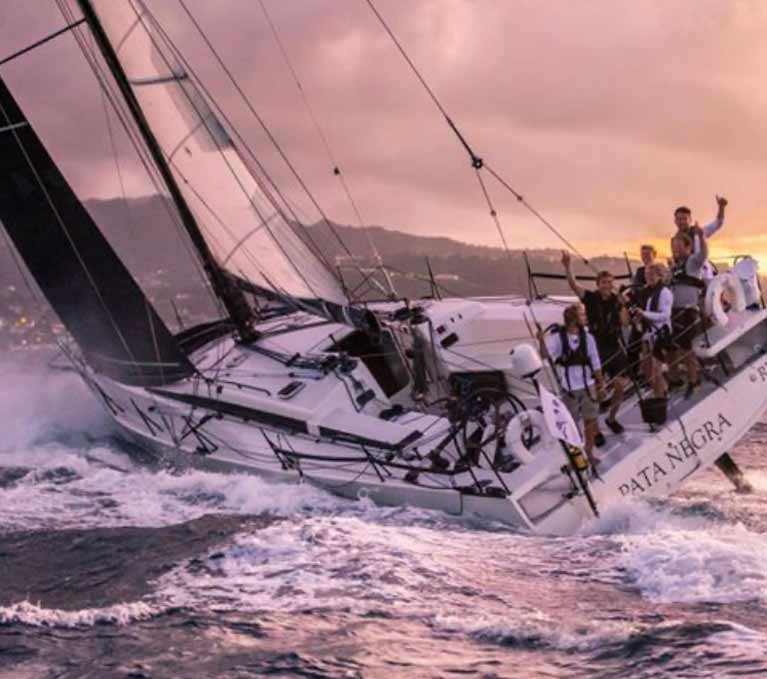 Pata Negra
Pata Negra
From then on it was a catch-up race. The team did not miss a gybe and calculated their course so precisely that despite travelling 3767nm, 200nm more than their symmetric-spinnaker’d opponents; snapping both masthead halyards; nearly blowing the mast fitting for the fractional and J3 halyard, Pata Negra not only caught up with the fleet but roared past them to finish 2nd overall, by any standards an amazing result!
Next on the agenda is to take the boat to Antigua and prep it for the Caribbean 600 which starts in February. Results here.
Smallest Boat in Fleet Wins RORC Transatlantic Race
Jangada, the smallest boat in the RORC Transatlantic Race was also the overall winner.
Richard Palmer's British JPK 10.10 Jangada was presented with the RORC Transatlantic Trophy in Grenada at a ceremony and prize-giving banquet held at Camper & Nicholsons Victory Bar and Restaurant. Racing Two Handed with Jeremy Waitt, Jangada scored the best corrected time under IRC to win the race overall and completed the 3,000nm race in 17 Days 10 hrs 11 mins 06 secs. Jangada is the first Two Handed team to win the antique sterling silver trophy, as well as the smallest boat to do so.
"This win absolutely exceeded all our expectations - a great start to the season!" commented Jangada's owner, Richard Palmer. "The competition out there certainly gave us a run for our money - Childhood 1 was doing 20 knots and we could never match that speed, and Pata Negra 12 knots, but we just said 'bring it on' and we raced hard all the way to the finish. Persistence and perseverance were the key to keep going for each three-hour watch. It was hard work but it paid off. It is absolutely fabulous to be back at Port Louis Marina in Grenada. We were here two years ago and we are looking forward to celebrating for a few days."
Guest of honour at the prizegiving was Dr Clarice Modeste-Curwen, Minister for Tourism and Civil Aviation. Honoured guests included Patricia Maher, CEO of the Grenada Tourism Authority, Nikoyan Roberts, Manager of Nautical Development for Grenada, Assistant Chinel Sandy, and Charlotte Fairhead, Port Louis Marina Manager.
For Jangada the decisive strategy was using weather forecasts to decide on the optimum route to Grenada, as Jeremy Waitt explains: "It was a progressive strategy; going to a certain point and then making the decision based on the forecast, trying to pick a route through. The big decision came on day 5, whether to stay north up against the high pressure or dive south for more breeze. By day 7 there would have been no get out, we would be committed. It was always going to be a bit of a gamble, but we managed to pick our way through a few light patches and when we got into the breeze we kept pushing. Jangada kept moving and although the boats to the south were faster, they were going a long way to get to the breeze. We think we got the navigation right and it's great to be here and to have won the race."
About 1,000nm from Grenada, Jeremy Waitt fell overboard while re-setting a twisted spinnaker. Jeremy was clipped onto the boat using a tether which is a requirement for all RORC offshore races. The sea state was up and had Jeremy not been tethered to Jangada, he would have disappeared from sight very quickly: "A wave caught us and I went straight over the side," explained Waitt. "I was being dragged at seven knots and that is a moment when you think about a few things, when you are in the middle of the ocean. The survival gene kicks in fairly quickly and it was a good bit of team work to get back on board. I have a few bruises but I don't think Richard was too impressed as I was slowing the boat down! When I was safely back on board, Richard said, 'shall we have a cup of tea?' I replied, let's get the spinnaker back up first!"
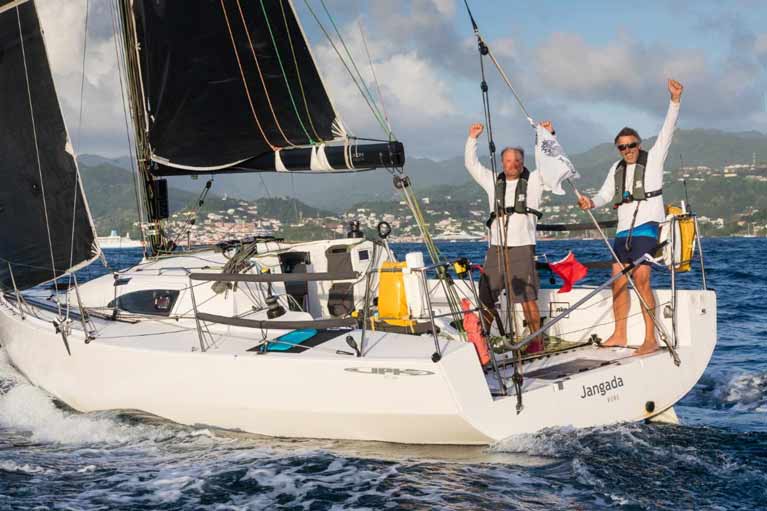 After 17 days and 10 hours, Jeremy Waiit (L) and Richard Palmer (R) cross the finish line outside Camper & Nicholsons Port Louis Marina, Grenada in the 2019 RORC Transatlantic Race © RORC/Arthur Daniel
After 17 days and 10 hours, Jeremy Waiit (L) and Richard Palmer (R) cross the finish line outside Camper & Nicholsons Port Louis Marina, Grenada in the 2019 RORC Transatlantic Race © RORC/Arthur Daniel
Benedikt Clauberg's Swiss First 47.7 Kali was the final boat to finish the RORC Transatlantic Race. Crossing the line at 19:28:19 UTC on 11 December, the crew were in time to join the prizegiving party and also celebrate finishing the race for the second year in a row.
Janet Grosvenor Receives RORC Lifetime Achievement Award
At a glittering Royal Ocean Racing Club (RORC) annual awards ceremony in London, Janet Grosvenor was presented with a Lifetime Achievement Award and made an Honorary Life Member for her immense contribution, both to the Club and the sport itself.
RORC CEO, Eddie Warden Owen acknowledged her commitment: "We are honouring a person who has given her life to the RORC," explained Warden Owen at the ceremony. "When Janet applied for the job as a receptionist in 1969 she never expected it to be a job for life, but as always in these situations, the Club evolved, her roles changed, and so did she." Janet, whose name is synonymous with the RORC, started as Membership Secretary and ended up as RORC Racing Manager.
"I could not have imagined what a wonderful tapestry of a working life I would go on to have," exclaimed an emotional and amazed Janet after receiving the award. To have my contribution to the Club acknowledged with a Lifetime Achievement Award and Hon. Life Membership of the Royal Ocean Racing Club is an enormous honour. Sailing is a great sport, with interesting people from all walks of life and the job involved worldwide travel - one cannot wish for more! The changes over the years have been enormous, so it has never been dull!" she explained.
Janet learnt to sail and logged her qualification miles to become a RORC member in 1978. She has served under 17 Commodores, nine Admirals and countless Committee Members; has rubbed shoulders with Royalty, Prime Ministers and celebrities from all over the world, and represented the RORC on countless committees, including the RYA's Offshore Racing Group, and served as the RYA's representative on World Sailing's Oceanic and Offshore Committee - receiving recognition from the RYA for the work she has done for the sport.
RORC Racing Manager, Chris Stone said: "Working with Janet Grosvenor has been nothing but a privilege and honour; she is a wonderful mentor. Her knowledge of RORC, offshore sailing throughout the world, its intricacies and the personalities within it are unmatched. Without her, the Club and our sport wouldn't be where it is today."
Janet has seen it all during her time at the RORC - the lows and the highs. One of her admitted low points was the 1979 Fastnet race disaster, and one of her toughest calls was the 25-hour delay to the 2007 Rolex Fastnet Race. "A very tough decision, but absolutely the right one as the fleet of 300 plus yachts met the impending storm in the Channel rather than the Celtic Sea, giving the opportunity for the 200 boats that did retire to find somewhere safe to shelter," explained Warden Owen. "She has done the job with enthusiasm, dedication, skill and determination, as well as with a good dollop of diplomacy, and not forgetting a good sense of humour."
Janet Grosvenor concluded: "It is a great privilege to have my name added to this list of Honorary Life Membership and I am extremely grateful to the Club."
Fastnet Race to Finish in Cherbourg, RORC Announce
The Royal Ocean Racing Club (RORC), organisers of the Rolex Fastnet Race, announced at a press conference today that the City of Cherbourg will host the finish of the Rolex Fastnet Race for the 2021 and 2023 editions of the biennial race. The move encourages and secures the future development of the race and will open it to more competitors; in 2019 the race had a waiting list of 150 boats.
Details of the announcement were made online today in a Facebook Live broadcast that attracted 254 viewers, as Afloat reported earlier here.
In his announcement, RORC Commodore Steven Anderson said he would consider returning to the previous finish city of Plymouth for 2025, for the 100th edition of the race, if facilities can be extended.
The new course will be 90 nautical miles longer and RORC say there is no decision yet on whether or not it will run before or after Cowes Week in 2021.
Rumours of the move to France first surfaced a year ago and were reported by Afloat here. And in September 2018, Afloat's WM Nixon blogged: Is This The Beginning Of The End Of The Fastnet Race As We Know It?
Online comments were swift and not altogether positive: Gareth Evans stating the Fastnet is "a British Tradition and British Race" and that it should really finish in Great Britain. Facebook Live Viewer Adrian Gray stated that it was 'stomach-churning' and that '96% are against this change'. Paul Browning said it was 'Terrible news. Sell out of the many for the vested interest of the elite'. But Fiona Tully remarked online: 'I can understand why they are moving it..... To facilitate the ever-growing demand for sailors that want to compete in this historic race and Plymouth perhaps just does not have the infrastructure or facilities for this demand'. Chris Shipman said: 'Fantastic idea and great to share this event with the French who are such prominent participants in the Fastnet race".
Others like Paul Cunningham said 'A precedent has now been set, that the race finish can be moved to anywhere that is approximately 600+ NM from Cowes after rounding the Fastnet Rock'. Kenneth Sharp commented 'That’s a long sail back for Irish yachts!'. Nick Barlow said that 'given the additional distance it will definitely favour the larger boats. This supports the need for a Corinthian Fastnet run by JOG and Plymouth clubs'.
The City of Cherbourg-en-Cotentin, The Communauté d’agglomération du Cotentin, the Conseil départemental de la Manche and Normandy Region have come together to support the race finish with a package that enhances the competitor experience with increased berthing, enhanced shoreside facilities, competitor functions and events in an exciting development for the race.
Since seven boats competed in the first race in 1925, the Royal Ocean Racing Club has continued to push the boundaries of participation in offshore racing. The 2019 Rolex Fastnet Race had 388 yachts on the start line from 27 different nations. The Club’s aim is to foster greater participation and improve access to the race. The enhanced facilities offered by Cherbourg will give the opportunity for more boats and sailors to take part in the Rolex Fastnet Race in future years.
Speaking about the benefits of Cherbourg as the finish venue, RORC Commodore, Steven Anderson, said: “It is an exciting time for this iconic and extremely successful race. Finishing the Rolex Fastnet Race in Cherbourg will encourage and secure the continued growth of the Club’s most prestigious event and provide an enhanced competitor experience. The enthusiasm of the French for offshore racing is legendary, and the City of Cherbourg-en-Cotentin, The Communauté d’agglomération du Cotentin, the Conseil départemental de la Manche and Normandy Region have been hugely passionate and committed partners in this initiative.”
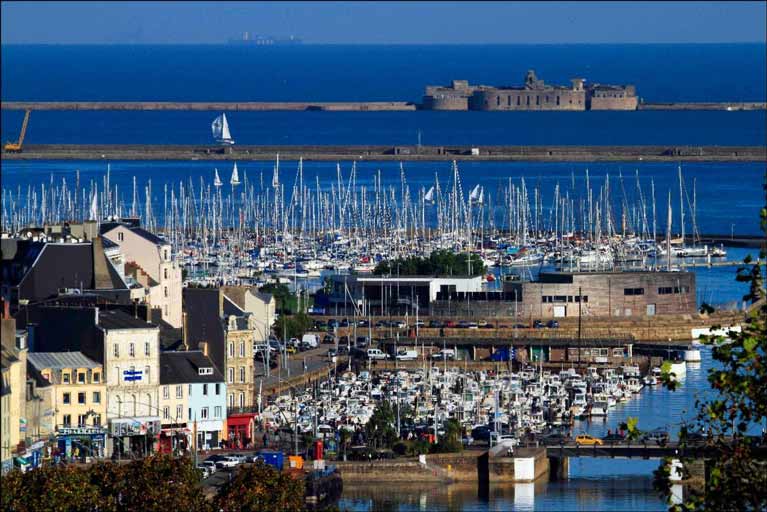 The City of Cherbourg will host the finish of the Rolex Fastnet Race in 2021 and 2023 Photo: JM Enault /Ville de Cherbourg en Cotentin
The City of Cherbourg will host the finish of the Rolex Fastnet Race in 2021 and 2023 Photo: JM Enault /Ville de Cherbourg en Cotentin
“The race has grown steadily over the past two decades and more and more people want to take part. We have had to limit entries in recent years because of berthing constraints, but Cherbourg offers significant additional berthing and improved facilities for competitors, so we will be able to take a larger number of entries and give more sailors the opportunity to compete in this very special race,” continued Anderson.
Jean-Louis Valentin, President of La Communauté d’agglomération du Cotentin said: “Cherbourg is one of France’s great channel ports, closely linked to naval history and transatlantic adventures, and the Cotentin Coast is home to the many prominent water sports events. Bringing the Rolex Fastnet Race finish to Cherbourg means that the City and Cotentin are now part of the club of coastal territories linked to a mythical offshore race. The adventure of a great race, sailors in the City and beautiful entertainment, will make the finish a popular ocean racing spectacle for the public. A Race Village and many festivities have already been planned in Cherbourg-en-Cotentin to invite Normans and sailing enthusiasts to take part in this great ocean festival.”
RORC CEO, Eddie Warden Owen commented: “This is an exciting chapter in the history of the Fastnet Race and the founding fathers who competed in the very first race in 1925 will be proud that the race has survived all these years and seen unprecedented growth. City of Cherbourg-en-Cotentin, The Communauté d’agglomération du Cotentin, the Conseil départemental de la Manche and Normandy Region will give the sailors a warm welcome. The French are known for their passion for offshore racing and French sailors regularly compete in and have won the Rolex Fastnet Race. This is exciting times for the Royal Ocean Racing Club and the Rolex Fastnet Race as we continue to evolve and expand for the benefit of our members and offshore racing sailors worldwide.”
Benoît Arrive, Mayor of Cherbourg-en-Contentin said: “Our City has a long history with the Royal Ocean Racing Club. Many sailors from Cherbourg-en-Cotentin have competed in the legendary Fastnet Race and for many of them, the RORC Season’s Points Championship remains a major competition. Several Cherbourgers have distinguished themselves in the Fastnet Race, Alexis Lioisin in particular, a recent double winner with his father. The Solent is not far from our port and I am very happy that we can bring them together by hosting this very important sailing event for the first time. Our port is used to hosting major sailing events and is looking forward to being the arrival city for the next two editions. 2021 and 2023 will be exceptional for the Rolex Fastnet Race.”
More than 5,000 sailors from around the world, racing in a dazzling variety of 570 yachts, took part in the 2019 RORC Season's Points Championship. The world's largest offshore racing series comprised 14 testing races and every race had its own coveted prize for the overall winner and for IRC class honours. The 2019 RORC Season's Points Championship destinations included the Caribbean islands of Antigua and Grenada, and the Spanish island of Lanzarote. There were six European destinations: France, Great Britain, Belgium, Ireland, Malta, and the Netherlands.
The 2019 Royal Ocean Racing Club Annual Dinner and Prize Giving was held in the Grand Connaught Rooms with 250 guests attending the spectacular black tie event. Prize winners, competitors, crews, RORC members and guests celebrated the year's achievements with the Royal Ocean Racing Club.
A champagne reception was followed by dinner and the prize giving in the Grand Connaught Rooms. Dating back to 1775, with its grand Georgian architecture and art-deco interiors, the historic building has hosted some of the world's leading politicians, royalty and celebrities. There was a huge ovation for the overall winner of the 2019 RORC Season's Points Championship, Black Sheep, and for the RORC Yacht of the Year, Wizard.
Winning the Jazz Trophy for first overall in IRC was Trevor Middleton's Sun Fast 3600 Black Sheep. Skippered by Jake Carter, the team collected five more awards: Jacob Carter was awarded the Keith Ludlow Trophy for the Navigator on the yacht that is First in IRC Overall, and the Duncan Munro Kerr Youth Challenge Trophy. Black Sheep also won the Grenade Goblet for first in IRC Three, the Serendip Trophy for Best Series Produced Yacht, and the Alan Paul Trophy for Consistent High Performance.
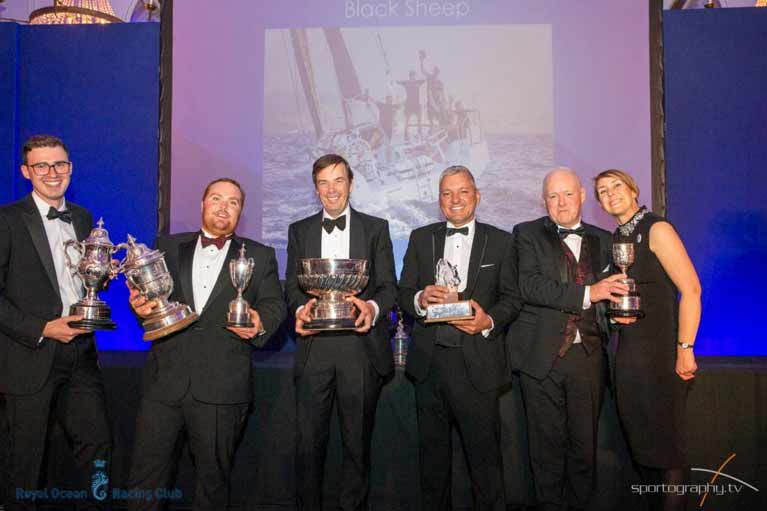 Trevor Middleton and team on Sun Fast 3600 Black Sheep collect the overall winners trophy, along with a hoard of silverware at the RORC Season's Points Championship © Sportography.tv
Trevor Middleton and team on Sun Fast 3600 Black Sheep collect the overall winners trophy, along with a hoard of silverware at the RORC Season's Points Championship © Sportography.tv
Black Sheep was crewed by friends who met during the Clipper Round the World Race and their debut race for the RORC season was the RORC Transatlantic Race. Black Sheep was the smallest yacht in the race, taking just under 17 days, and after IRC time correction, was second overall. During the season, Black Sheep's main rival for IRC Three, and for the overall season win, was another British Sun Fast 3600, Bellino. Bellino was raced Two-Handed by Rob Craigie and Deb Fish. Bellino beat Black Sheep by one place in the Rolex Fastnet Race, to set up a winner take-all final encounter in the Rolex Middle Sea Race. Black Sheep won the duel, winning the 2019 RORC Season's Points Championship overall and IRC Three by a small margin; just 2.2 points.
"We set out to win the Championship, but it was not until halfway through the season that you realise how big a commitment it is," commented Trevor Middleton. "Black Sheep has done close to 10,000 miles of racing and deliveries. The team come from the Clipper Race and this has been a fantastic, yet different experience. Whilst the RORC races are shorter, the Clipper experience made us stronger for the longer races. A big thank you to the RORC, their organisation is excellent, their entry system and race procedures are second to none. Also, when you get to places like Lanzarote, Grenada and Antigua, the shoreside logistics and parties are so very well done."
The 2019 RORC Yacht of the Year, winning the Somerset Memorial Trophy was Peter and David Askew's Volvo Open 70 Wizard, which is the first American yacht to win the accolade for over 20 years. Wizard's overall win in the RORC Caribbean 600 and the Rolex Fastnet Race in the same season is unprecedented. This double victory has never been achieved before by any other yacht.
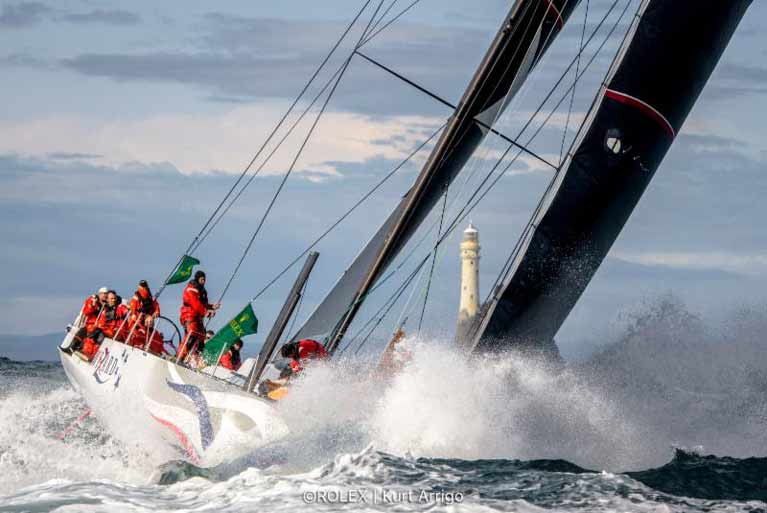 Wizard, Peter & David Askew's Volvo Open 70 - RORC Yacht of the Year Photo: Rolex/Kurt Arrigo
Wizard, Peter & David Askew's Volvo Open 70 - RORC Yacht of the Year Photo: Rolex/Kurt Arrigo
"The Fastnet Challenge Cup is now at the New York Yacht Club - being able to display the Cup at the NYYC is really special. At the NYYC annual awards last weekend we got a chance to study the inscribed names of the previous winners. It was an "oh my" moment to see the name Wizard in close proximity to names like "Imp" and "Tenacious", boats of immense historical importance," commented David and Peter Askew. "When Peter and I were young boys we idolized these boats and the sailors that crewed them and dreamed of having our own success someday. We think a real measure of success is to earn the recognition of your peers. To be recognized by a group of peers on the other side of the Atlantic Ocean is a true honour! To be awarded the Somerset Memorial Trophy is something we will always be very proud of.
"Peter and I have always operated on the principle to have the best tool possible for the job. That being said, everything else counts too, plus a little luck. We had the perfect storm of all of the above. We set out to win the Atlantic Ocean Racing Series and we felt the VO 70 would be the best platform. Charlie Enright, Mark Towill, Will Oxley and the rest of the guys did the real work. All said and done, we think our success is proof that our process works.
"We are disappointed to not be able to personally accept the Somerset Memorial Trophy. Peter has foot surgery some days prior and I must remain in the States to receive an award from my local Yacht Club (Annapolis Yacht Club) that same night. We will have a crew member, Roy Disney in attendance to accept on behalf of the entire Wizard team."
After the prize-giving, guests partied until the early hours with a live set from Brando, courtesy of RORC partner Sevenstar Yacht Transport. Fastnet Marine Insurance also supported the event, as they have done for the last 11 years, along with William Grant & Sons Distillers and Ocean Safety.
The 21st edition of the RORC Season's Points Championship will start on 23rd November 2019 with the RORC Transatlantic Race.
List of 2019 RORC Season's Points Trophy Winners
Season's Points Championship Overall Winner - Jazz Trophy for 1st in IRC Overall: Sun Fast 3600, Trevor Middleton with Black Sheep
Also winning: Keith Ludlow Trophy for the Navigator on the yacht that is First in IRC Overall: Duncan Munro Kerr Youth Challenge Trophy - Jacob Carter from Black Sheep, 1st in IRC Three winning the Grenade Goblet, Serendip Trophy for Best Series Produced Yacht, Alan Paul Trophy for Consistent High Performance,
The 2019 Yacht of the Year winning the Somerset Memorial Trophy: Wizard, Volvo Open 70, David & Peter Askew
2019 Class winners:
Multihull: Buzz, Seacart 30, Ross Hobson
Class40: Eärendil, Catherine Pourre
IRC Zero: Tala, Botin IRC 52, David Collins
IRC One: Ino XXX, HH42, James Neville
IRC Two: Courrier Recommandé, JPK 1180, Gery Trentesaux
IRC Three: Black Sheep, Sun Fast 3600, Trevor Middleton
IRC Four: Foggy Dew, JPK 10.10, Noel Racine
IRC Two-Handed: Bellino, Sun Fast 3600, Rob Craigie & Deb Fish
Special Trophies:
Seamanship Trophy for an Outstanding Act of Seamanship: Roy Disney with Pyewacket
Meritorious Award for outstanding keelboat performance by a RORC member:
Grant Gordon, Louise Racing (Dragon) - 1st King Juan Carlos Trophy, 2nd Dragon World Championship, 5th Dragon Gold Cup
Arambalza Swan Cup for the Best Swan: Swan 38, Jonathan Rolls, with Xara
Beken Trophy for Concours d'Elegance: Fred Shepherd Yawl from 1939 Paul Moxon with Amokura
Assuage Tankard for 1st Overall in the Morgan Cup Race and Winning the J/109 RORC Trophy J/109: David McGough with Just So
Assuage Tankard for 1st Overall in the Myth of Malham Race and 1st Overall in the Cervantes Trophy Race: Farr GP42, Ed Fishwick with Redshift
David Fayle Memorial Cup for Best Sailing School Yacht: First 40, Yuri Fadeev of Capstan Sailing School with Skylander
Haylock Cup for Best British Service Yacht: X-41, Army Sailing Association with British Soldier
Multihull (26 boats):
1st Multihull: Seacart 30, Ross Hobson, with Buzz
2nd Multihull: Normanni 34, Joel Malardel, with Tancrède
3rd Multihull: Dazcat 1295, James Holder, with Slinky Malinki
4th Multihull: Trimaran, Andrew Fennell, with Morpheus
5th Multihull : Ts42, Christian Guyader, with Guyader Gastronomie
Class40 (29 boats):
Concise Trophy for 1st Class40: Catherine Pourre with Eärendil
2nd Class40: Ian Hoddle with Manic
3rd Class40: Luke Berry, with Lamotte - Module Création
4th Class40: Renaud Courbon, with Boogie Down
5th Class40: Henrik Bergesen, with Hydra
IRC Zero (65 boats):
Europeans Cup for 1st in IRC Zero: Botin IRC 52, David Collins, with Tala
2nd in IRC Zero: Cookson 50, Franco Niggeler, with Kuka 3
3rd in IRC Zero and Winning the Highwayman Cup for best elapsed time of an IRC yacht in the Cervantes Trophy, Morgan Cup, Cowes Dinard St Malo and Cherbourg races:Volvo Open 70, Lance Shepherd, with Telefonica Black
4th in IRC Zero: Carroll Marine 60, Derek Saunders - Windward Sailing, with Venomous
5th in IRC Zero: Ker 46, Van Uden Holding B.V. with Van Uden
IRC One (124 boats):
Trenchemer Cup for 1st in IRC One: HH42, Rear Commodore, James Neville with
Ino XXX
2nd in IRC One, 4th in IRC Overall and also winning the Peter Harrison Youth Trophy for a yacht racing under IRC with a minimum of 33% of the crew under 25, and winning an Assuage Tankard for 1st Overall in the Cherbourg Race: A13, Mark Emerson, with Phosphorus II
3rd in IRC One: Ker 40, Lars & Birgitta Elfverson , with Keronimo
4th in IRC One: XP 44, Arto Linnervuo, with Xtra Staerk
5th in IRC One: JND 39, Didier Gaudoux, with Lann Ael 2
IRC Two (97 boats):
Winning the Emily Verger Plate for 1st in IRC Two and Winning the Stradivarius Trophy for the Best Overseas Yacht and also Winning a medallion for 5th in IRC Overall:
JPK 1180, Gery Trentesaux, with Courrier Recommandé
2nd in IRC Two and 3rd in IRC Overall: JPK 1180, Tom Kneen with Sunrise
3rd in IRC Two and winning the Dillon Perpetual Ladies' Trophy: J/133, Gilles Fournier & Corinne Migraine, with Pintia
4th in IRC Two and Winning an Assuage Tankard for 1st Overall in the Cowes Dinard St Malo Race: Oyster 48, Ross Applebey, with Scarlet Oyster
5th in IRC Two and 4th in IRC Two-Handed: Sun Fast 3600, Gavin Howe, with Tigris
IRC Three (147 boats):
1st in IRC Three winning the Grenade Goblet (+ overall winner of 2019 and other trophies - see above): Sun Fast 3600, Trevor Middleton with Black Sheep
2nd in IRC Three and 2nd in IRC Overall, plus 1st in IRC Two-Handed, winning the Psipsina Trophy and also Winning the Boyd Trophy for 1st in the Mixed Two-Handed Division: Sun Fast 3600, Rob Craigie & Deborah Fish, with Bellino
3rd in IRC Three and 3rd in IRC Two-Handed: JPK 1080, Louis-Marie Dussere, with Raging-bee²
4th in IRC Three and 5th in IRC Two-Handed: Sun Fast 3600, Vice Commodore, Nick Martin, with Diablo
5th in IRC Three: A35, Richard Elliott, with Eaujet
IRC Four (141 boats):
Winning the Assuage Trophy for RORC Members and Winning the Cowland Trophy for 1st in IRC Four: JPK 10.10, Noel Racine, with Foggy Dew
2nd in IRC Four: JPK10.10, Emmanuel Pinteaux, with Gioia
3rd in IRC Four and 2nd in IRC Two-Handed: Sun Fast 3200, Nigel Goodhew, with Cora
4th in IRC Four and Winning the Freddie Morgan Trophy for a Classic Yacht in IRC: S&S 41, Harry Heijst, with Winsome
5th IRC Four and Winning the Oldland/Watts Aquadanca Trophy for the Sigma 38 with the highest Season's Points: Sigma 38, Chris Choules, With Alacrity
2020 IRC European Championships at Cork Week
The 2020 IRC European Championship will be held at Cork Week as part of the unique celebration of the 300th anniversary of the Royal Cork Yacht Club.
As Afloat previously back as 2016, the 5th edition of the IRC European Championship will take place in Cork Harbour over five days of racing from Monday 13th July to Friday 17th July 2020. The championship is expected to attract a record fleet of highly competitive IRC rated boats vying for the overall win and class honours.
On Wednesday 8th July, prior to the IRC European Championship, the Morgan Cup Race will start from Cowes, bound for Cork. Organised by the Royal Ocean Race Club (RORC) since 1958, this will be the first time that the course has been set across the Celtic Sea to Cork. The 324nm race is expected to attract a substantial fleet and will be a weighted race within the world's largest offshore racing programme, the RORC Season's Points Championship.
"With a large majority of Irish boats already holding IRC Endorsed certificates there is the prospect of many strong Irish entries"
"The Irish IRC fleet are highly competitive and with a large majority of Irish boats already holding IRC Endorsed certificates there is the prospect of many strong Irish entries," commented Director of Rating for IRC, Dr Jason Smithwick. "With this diverse range of boat types racing under the IRC rating system we have been working closely with the Royal Cork Yacht Club to create an exciting and varied race programme with a mixed range of courses. This balance of course types will allow all boats to have a chance and create a fair and interesting event for the competitors. The IRC rating offices have also been working with the organisers to have a thorough programme of equipment inspection to ensure good equipment control before and during the event," continues Smithwick.
Corinthian teams racing small and medium size boats have enjoyed tremendous success in the IRC European Championship. In 2016 the inaugural championship was hosted by the Royal Cork Yacht and was won overall by Royal Cork's Paul Gibbons racing Quarter Tonner Anchor Challenge. For the last three championships French teams have won overall. The 2020 IRC European Championship will feature high performance boats, including a number of FAST40+ teams expected to be racing under IRC. Prizes are also awarded to the best Corinthian team, as well as individual IRC Classes.
Overall winners of the IRC European Championship
- 2016 Paul Gibbons' Quarter Tonner Anchor Challenge (Cork, Ireland)
- 2017 Guy Claeys' JPK 10.10 Expresso 2 (Marseille, France)
- 2018 Didier le Moal's J/112E J-Lance (Cowes, UK).
- 2019 Yves Ginoux's Farr 36 Absolutely II (San Remo, Italy)
For the 2020 IRC European Championship, competitors will enjoy wide-ranging and competitive racing afloat, as well as the Royal Cork's unique and historic celebration of their tricentennial.
"We're delighted to welcome the IRC European Championships back in 2020 where the fleet will enjoy a varied programme of races set in and around Cork Harbour," commented Cork Week Director of Racing, Rosscoe Deasy. "Shorter racecourses will be specially laid outside of Roches Point, a wonderful sailing area with open sea conditions and stable winds, while the famous 'Harbour Race' will bring additional navigational and tactical challenges. A 10-14 hour 'Coastal Race' is planned along the treacherously beautiful Irish headlands, providing a demanding test of crew focus and endurance. Admittedly the real test will be found ashore in Crosshaven where only the stoutest of hearts will be able to resist the siren call of the legendary Cork Week craic. It's going to be a great event!"
Representatives of the International Rating Certificate (IRC) from around the world met in France for two days of debate and discussion at the beginning of October.
The 2019 Congress was hosted by l’Union Nationale pour la Course au Large (UNCL) and the Société des Régates d'Antibes, and delegates arriving into Nice airport enjoyed an aerial view of the racing at Les Voiles de St Tropez.
Congress 2019 was chaired for the first time by Irishman and former Royal Ocean Racing Club (RORC) Commodore Michael Boyd, supported by Vice Chairs Malcolm Runnalls, and Carl Sabbe (BEL). Delegates gathered from Australia, Belgium, Canada, France, Great Britain, Ireland, Japan, Netherlands, Turkey and the USA; and from organisations including RORC, UNCL, the Royal Yachting Association and the International Maxi Association.
The annual conference provides a good forum for IRC owners’ representatives and administrators from many countries to share experiences and ideas from different perspectives and racing cultures; this year was no exception with both formal and informal discussions taking place over the weekend. In additional meetings, the IRC Congress agreed on a number of developments for 2020 as a result of research by the Technical Committee throughout the year, while the IRC Policy Steering Group reinforced the good relations between RORC and UNCL, joint owners of the IRC Rule.
"The 2020 IRC European Championship will be hosted by the Royal Cork Yacht Club as part of the club's 300th anniversary year"
All at Congress agreed that great events drive participation, and it was interesting to hear of initiatives aimed at increasing IRC fleets, particularly amongst cruiser-racers. For those aspiring to IRC Champion status two events confirmed for 2020 are the IRC European Championship in Ireland in July, hosted by the Royal Cork Yacht Club as part of the club's 300th anniversary year, and the ORC/IRC World Championship hosted in Newport by the New York Yacht Club in September.
IRC rule changes approved for 2020 include rules relating to whisker poles, the input of list angle for water ballasted boats, the definition of bulb weight and several housekeeping items. The Technical Committee have agreed an enhanced formulation for 2020 to improve the treatment of different fin keel types and water ballasted boats and the rating of whisker poles. In addition, research on flying headsails (also referred to as ‘code zero’ headsails) has made excellent process and the intention is to publish a definition early in 2020 and offer trial certificates later in the year.
The Congress Minutes and associated documents including IRC 2020 Rule changes are online here


